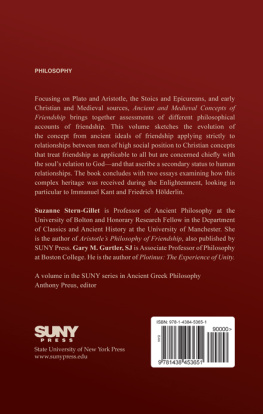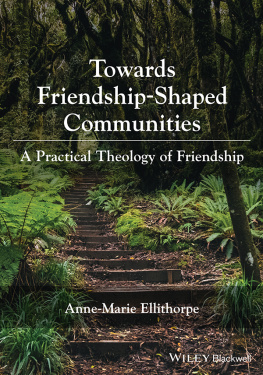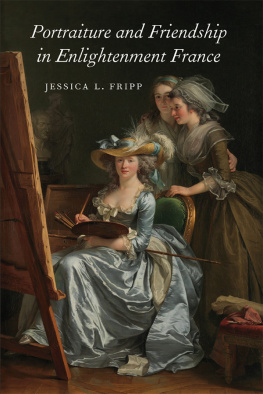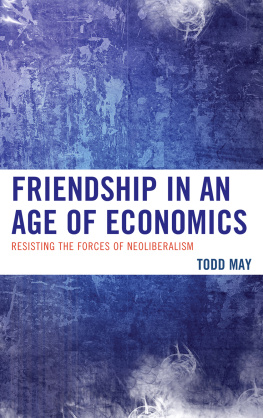A NCIENT AND M EDIEVAL
C ONCEPTS OF F RIENDSHIP
A NCIENT AND M EDIEVAL
C ONCEPTS OF F RIENDSHIP
Edited by
Suzanne Stern-Gillet
and
Gary M. Gurtler, SJ
Published by State University of New York Press, Albany
2014 State University of New York
All rights reserved
Printed in the United States of America
No part of this book may be used or reproduced in any manner whatsoever without written permission. No part of this book may be stored in a retrieval system or transmitted in any form or by any means including electronic, electrostatic, magnetic tape, mechanical, photocopying, recording, or otherwise without the prior permission in writing of the publisher.
For information, contact State University of New York Press, Albany, NY
www.sunypress.edu
Production by Eileen Nizer
Marketing by Michael Campochiaro
Library of Congress Cataloging-in-Publication Data
Ancient and medieval concepts of friendship / edited by Suzanne Stern-Gillet and Gary M. Gurtler, SJ
pages cm. (SUNY series in ancient Greek philosophy)
Includes bibliographical references and index.
ISBN 978-1-4384-5365-1 (hardcover : alk. paper)
ISBN 978-1-4384-5366-8 (e book)
1. Friendship. 2. Philosophy, Ancient. 3. Philosophy, Medieval. I. Stern-Gillet, Suzanne, 1943 editor of compilation. II. Gurtler, Gary M., 1947 editor of compilation.
B187.F75A53 2014
177'.6209dc23 |
2013049696 |
10 9 8 7 6 5 4 3 2 1
To Ranjan, with love
Suzanne
In Memoriam John Cleary
Gary
SUNY series in Ancient Greek Philosophy
Anthony Preus, editor
P HILIA IN P LATO
Dimitri El Murr
Introduction
The Platonic conception of love (ers) is one of most the debated issues in the canon. By comparison, the Platonic conception of friendship (philia) suffers from underexposure. This exegetical imbalance is rooted in the widespread belief that, when compared to Aristotles grander and supposedly more stimulating account of friendship, significantly placed at the heart of his ethical theory, Plato does not seem to have much to say, philosophically, about friendship.
One of the main reasons for what is hardly more than a prejudice is that Plato seems to ignore deliberately the distinction Greek culture and Greek terminology made between philia and ers, between friendship and erotic love. Indeed, in several passages where Plato considers philia a form of interpersonal relationship (see Symp. 179c, 182c, 184b, 185a, 192b, 209c), he seems more interested in explaining the power of ers than in defining a specific relationship of philia.
The Lysis, Platos dialogue devoted to philia, is paradigmatic of this ambiguity. The relationship between lover (erasts) and beloved (ermenos) provides the general setting for the investigation of philia (see Lys. 206ae), so much so that most commentators would agree with David Konstan in claiming that the dialogue commonly read as Platos treatment of friendship [] has as much to do with ers and other kinds of affection as with friendship. Plato was chiefly concerned with the nature of desire or attraction in general, of which friendship is one type.considered in depth the specific nature of philia, as distinct from erotic love, and the essential role it is given in the good life, Platos account of friendship seems to narrow philia to ers, leaving friendship itself untreated.
Admittedly, the topic of friendship is massively in evidence in the political dialogues. No matter what interest Plato had in interpersonal friendship, there can be no doubt that he considered friendship a primarily political phenomenon, perhaps even to the exclusion of any other.
From a purely philosophical point of view, this would be a deeply unsatisfactory outcome. How could a serious philosopher like Plato consider that interpersonal philia is not sufficiently interesting to give rise to independent philosophical treatment while at the same time making it an essential ingredient of the cement of society? A quick comparison with Aristotle will help bring out the problem.
As Aristotle makes clear in the Politics, friendship is an indispensable means to the good life which any city endeavors to achieve. Not only does Aristotle succeed in developing a theory of friendship comprehensive enough to account for the importance of philia in both the ethical and the political spheres; even more significantly, his analysis of the political importance of friendship stems from, and depends on, his ethical views on philia.
Platos theory of friendship, so I shall show in this chapter, is quite as coherent as Aristotles. Plato not only makes a distinction between erotic love and friendship, but he, no less than Aristotle, has a distinct conception of virtuous friendship. Such a conception of virtuous friendship requires that there be between the friends a form of resemblance which obeys a specific law of attraction, namely, the principle that like loves like. Virtuous friendship so conceived may well throw light on the contrast between Platos treatment of civic friendship in the Kallipolis of the Republic and his treatment of the same subject in the city of Magnesia as described in the Laws.
Studies of friendship in Plato inevitably, and rightly so, start from the complex arguments of the Lysis.), such a conception conflicts with the approach to the same topic in the Republic.
1. Friendship and the Laws of Attraction: Leg. 8, 836e837d
One of the issues raised by the Athenian Stranger in book eight of the Laws concerns sexual behavior. The young men and women of Magnesia will devote their time to the activities of music, dancing, and sacrificing, all activities which require a life of leisure with little or no time spent on hard physical labor. Even so, the Athenian notes, physical labor has the obvious advantage of starving the appetites for pleasure by distracting the body (Leg. 841a). Since they will experience no such labor, what shall we make of the bodily needs of the young people of Magnesia as they associate with each other on friendly terms (835d5)? How can the law control their sexual desires? In order to adopt an appropriate legislation, one that will be able to counterbalance the irrational power of sexual attraction, the Athenian suggests we should be clear about what is at stake. Hence the urge to define with all due precision the laws of erotic attraction.
A THENIAN . [] If you want to get these things straight, you have to analyse the nature of friendship and desire and love, as people call it (tn ts philias te kai epithumias hama kai tn legomenn ertn). There are two separate species, plus a third which is a combination of both (ex amphoin triton allo eidos). But one term (hen onoma) covers all three, and that causes no end of muddle and confusion.
C LEINIAS . Hows that?
A THENIAN . I suppose that we call friend (philon) (1) what is similar (
















